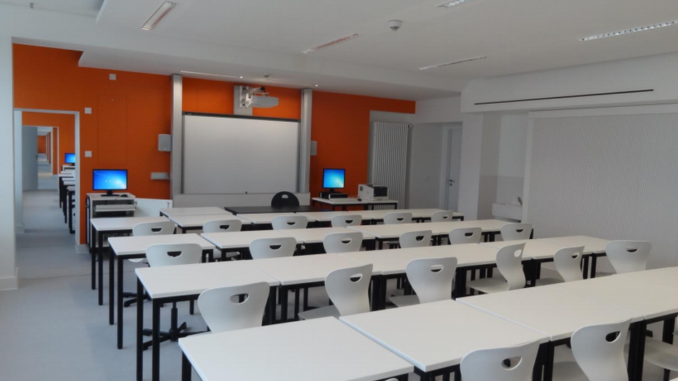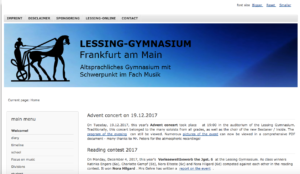
When people ask whether I miss school in Germany or not, I tell them how lucky I feel to be here. The German school system is very different from the American school system. I went to kindergarten from the age of three until I was five years old. After kindergarten, children usually attend elementary school at the age of six or seven. I was very lucky that I could attend my first day of elementary school on my sixth birthday, otherwise, I would have had to wait for a whole other year! In Germany, elementary school goes from first to fourth grade. Most children attend public elementary school. However, there were some private schools around. In fourth grade, the students take a test to determine on what level they will continue their education. In Germany, there are no middle schools. Anything after elementary school is considered a secondary school.
After 4th grade we had so called Gymnasiums for students who were fast learners, Real schools were for students who were not bad in school but did not necessarily like it, and Haupt schools were for students who needed more time to learn the curriculum. I was lucky enough to get into the higher level of secondary school. Gymnasiums used to go from 5th to 13th grade, but my grade was the first one to attend the new Gymnasium system which stopped at 12th grade. Real schools go from 5th to 10th grade and Haupt schools go from 5th to 9th grade.
Personally, I feel like the students in Germany were divided at too young an age.
Personally, I feel like the students in Germany were divided at too young an age. In 4th grade many friendships dissolved because some students were labeled “dumb” and some were labeled “smart.” It wasn’t that the “smart” people didn’t want to hang out with the ones who didn’t do well on the 4th grade test, but, rather, some people believed that they weren’t “smart” enough for some people.
In 5th grade, I attended Lessing-Gymnasium, which was the best Gymnasium in Frankfurt, the city I used to live in. Therefore, my school was a little different from other Gymnasiums. We had a very strict curriculum and more discipline than my friends who attended other Gymnasiums in the area. I had weekly schedules because all my classes would not fit in one or two days. In 5th grade, my whole grade was divided into 4 groups; 5A, 5B, 5C, and 5D. I was in 5A with about 25 other students who I had all my classes with. Everyone in my group had the same schedule and we did not have any encounters with the other groups. I always felt like I could have had great friendships with some of the students from other groups, but, unfortunately, that’s not how my school worked.
 Because I had different classes at different times from Monday to Friday, my days were never the same. I usually started 1st period at 7:55 am and left school at either 1:10 pm, 3:00 pm, or 5:15 pm. From 5th grade on I had art, music, and physical education classes, which were usually block periods. I took math, biology, Latin, German, English, Geography, philosophy, civics, computer science and history. In 6th grade, my teachers added chemistry and physics into my schedule, and in 8th grade they let us pick between French and Ancient Greek. I chose French. It was a lot to handle, but it was the curriculum and we couldn’t change that. Before any period started, we had to stand in front of the teacher and simultaneously greet the teacher. Then we sat down and the classes began. We had a 15 minutes break between 2nd and 3rd period, a 20 minute break between 4th and 5th period, and a 35 minutes break between 6th and 7th period. Between 1st and 2nd, 3rd and 4th, 5th and 6th, and 7th and 8th period we had 5 minutes breaks.
Because I had different classes at different times from Monday to Friday, my days were never the same. I usually started 1st period at 7:55 am and left school at either 1:10 pm, 3:00 pm, or 5:15 pm. From 5th grade on I had art, music, and physical education classes, which were usually block periods. I took math, biology, Latin, German, English, Geography, philosophy, civics, computer science and history. In 6th grade, my teachers added chemistry and physics into my schedule, and in 8th grade they let us pick between French and Ancient Greek. I chose French. It was a lot to handle, but it was the curriculum and we couldn’t change that. Before any period started, we had to stand in front of the teacher and simultaneously greet the teacher. Then we sat down and the classes began. We had a 15 minutes break between 2nd and 3rd period, a 20 minute break between 4th and 5th period, and a 35 minutes break between 6th and 7th period. Between 1st and 2nd, 3rd and 4th, 5th and 6th, and 7th and 8th period we had 5 minutes breaks.
Our classes were usually 55 minutes long. Tests and quizzes looked a little different. We had short answer questions only, rather than multiple choice like it is in the United States. We took tests after every chapter and 2 quizzes in between tests in every class, even in music and gym class. The tests were pretty hard because the teachers did not give us review packets and did not review with us in class. However, I am thankful for the independence that I learned in Germany and I work really good under pressure now.
I consider myself very lucky that I had the chance to move to the United States.
After school, we had a lot of homework but, fortunately, we did not have the same classes every day and therefore had more time to do our homework. We did not have any sports in school but we did have one or two clubs, such as drama club. Many people joined clubs and other after school activities outside of school. Seeing all the sports and clubs in the United States sometimes makes me wonder how my experience in Germany could have been different. There was no school spirit and, therefore, no fun. School was all about discipline and education rather than experience and communication, like it is in the United States. We also did not have school busses and therefore had to use public transportation. I was lucky enough that my school was only about 45 minutes away from my house using public transportation. Otherwise, I would have had to leave my house much earlier like my other friends.
The Gymnasium leads to a diploma called the Abitur, if you pass the oral and written exam. I moved to the United  States in 9th grade, but, if I stayed in Germany, I would have had to pick two courses of my choice in 10th grade that I would have taken my Abitur exam in. The curriculum ends in 11th grade, and in 12th grade teachers prepare students for their exams. Real and Haupt school students get other diplomas that unfortunately give them a very bad chance of getting into college. Those students usually do not go to college, but in Germany there are many jobs that let you learn the job for about a year or two and then give you a position. Our summers were six weeks long, but we did have two weeks breaks in October, December, and April.
States in 9th grade, but, if I stayed in Germany, I would have had to pick two courses of my choice in 10th grade that I would have taken my Abitur exam in. The curriculum ends in 11th grade, and in 12th grade teachers prepare students for their exams. Real and Haupt school students get other diplomas that unfortunately give them a very bad chance of getting into college. Those students usually do not go to college, but in Germany there are many jobs that let you learn the job for about a year or two and then give you a position. Our summers were six weeks long, but we did have two weeks breaks in October, December, and April.
The German school system is very different from the American school system and I consider myself very lucky that I had the chance to move to the United States. Experiencing both school systems showed me how much the set curriculum could change the experience. In the United States, we not only get to learn new information every day but we also get to have a great experience with less stress with time spent more meaningfully.
*Editor’s note: more information about Lessing Gymnasium can be found here.

